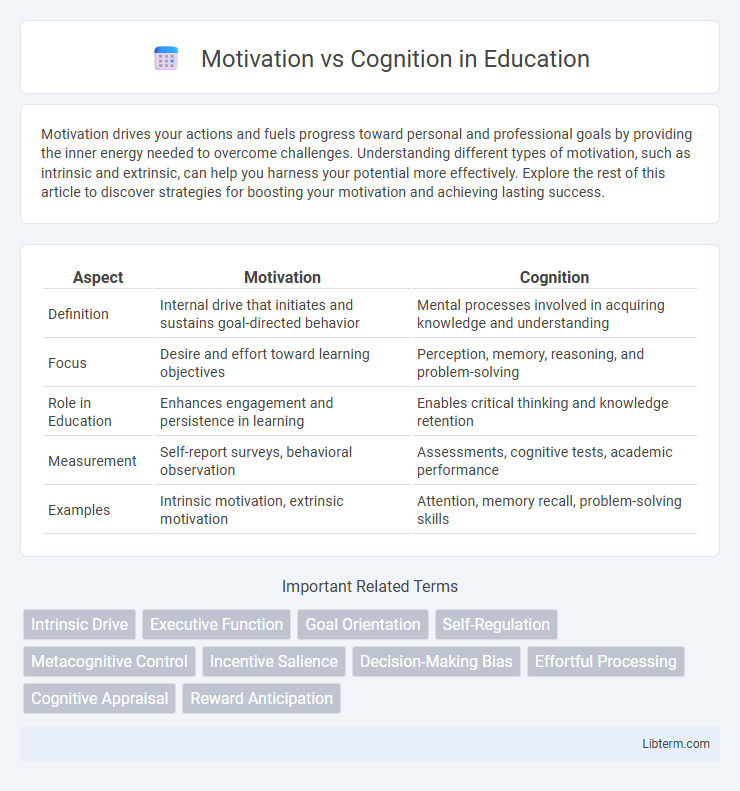Motivation drives your actions and fuels progress toward personal and professional goals by providing the inner energy needed to overcome challenges. Understanding different types of motivation, such as intrinsic and extrinsic, can help you harness your potential more effectively. Explore the rest of this article to discover strategies for boosting your motivation and achieving lasting success.
Table of Comparison
| Aspect | Motivation | Cognition |
|---|---|---|
| Definition | Internal drive that initiates and sustains goal-directed behavior | Mental processes involved in acquiring knowledge and understanding |
| Focus | Desire and effort toward learning objectives | Perception, memory, reasoning, and problem-solving |
| Role in Education | Enhances engagement and persistence in learning | Enables critical thinking and knowledge retention |
| Measurement | Self-report surveys, behavioral observation | Assessments, cognitive tests, academic performance |
| Examples | Intrinsic motivation, extrinsic motivation | Attention, memory recall, problem-solving skills |
Introduction to Motivation and Cognition
Motivation drives goal-directed behavior by activating, guiding, and sustaining actions, while cognition involves processing information through perception, memory, and reasoning. Understanding the interplay between motivation and cognition reveals how mental processes influence the initiation and persistence of motivated behaviors. Research shows that motivation can enhance cognitive functions such as attention and problem-solving, which are essential for effective decision-making and action planning.
Defining Motivation: Key Concepts
Motivation is defined as the internal processes that initiate, guide, and sustain goal-directed behavior, encompassing both intrinsic and extrinsic factors. Key concepts include drive theories that explain motivation as biological needs, and incentive theories that focus on external rewards as stimuli for action. Understanding motivation involves analyzing arousal levels and expectancy-value models that predict the direction and intensity of behavior based on anticipated outcomes.
Understanding Cognition: Core Elements
Understanding cognition involves analyzing core elements such as perception, attention, memory, and reasoning that govern how individuals process information and make decisions. Cognitive processes enable the interpretation of sensory input, problem-solving, and the formation of knowledge, directly influencing behavior and learning outcomes. Each component interacts dynamically to support complex mental functions essential for adaptation and goal-directed activity.
Differences Between Motivation and Cognition
Motivation refers to the internal processes that drive goal-directed behavior, while cognition encompasses mental processes such as perception, memory, and problem-solving. Motivation primarily influences the initiation, intensity, and persistence of actions, whereas cognition involves the acquisition and manipulation of knowledge. Understanding their differences helps clarify how desire and thought interact to shape human behavior.
The Interplay Between Motivation and Cognition
Motivation drives goal-directed behavior by influencing cognitive processes such as attention, memory, and decision-making, shaping how information is processed and prioritized. Cognitive functions enable the evaluation of potential outcomes, supporting motivation through expectancy and value assessments that guide behavior toward rewards. The dynamic interplay between motivation and cognition underpins adaptive behavior, where motivational states modulate cognitive control mechanisms to optimize performance and goal attainment.
The Role of Motivation in Cognitive Processes
Motivation significantly influences cognitive processes by enhancing attention, memory encoding, and problem-solving abilities. High motivational states increase dopamine release, which activates neural pathways associated with learning and decision-making. This interaction between motivation and cognition improves goal-directed behavior and adaptive thinking in complex tasks.
How Cognition Influences Motivation
Cognition influences motivation by shaping how individuals interpret and evaluate goals, risks, and rewards through mental processes such as perception, memory, and reasoning. Cognitive appraisals determine the perceived value and feasibility of tasks, thereby directly impacting the intensity and persistence of motivational states. Neural mechanisms involving the prefrontal cortex mediate this interaction by integrating cognitive assessments with motivational drives to guide goal-directed behavior.
Real-World Examples: Motivation vs Cognition
Motivation drives individuals to initiate and sustain goal-directed behaviors, as seen in athletes training rigorously to win competitions, while cognition encompasses the mental processes involved in understanding, problem-solving, and decision-making, such as a chess player analyzing complex moves. In workplace settings, motivated employees often demonstrate higher productivity, but effective cognition enables strategic planning and critical thinking essential for project success. Real-world examples highlight how motivation fuels persistence, whereas cognition shapes the methods and solutions used to achieve objectives.
Implications for Learning and Performance
Motivation drives the intensity and persistence of learning efforts, while cognition governs information processing and problem-solving abilities during tasks. High motivation enhances cognitive engagement, leading to improved memory retention, critical thinking, and academic performance. Understanding the interaction between motivation and cognition is essential for designing effective educational strategies that optimize student learning outcomes and workplace productivity.
Conclusion: Integrating Motivation and Cognition
Integrating motivation and cognition enhances understanding of human behavior by highlighting the reciprocal influence between goal-driven desires and cognitive processes such as attention, memory, and decision-making. This synergy drives adaptive learning, problem-solving, and performance across various contexts, including education, work, and therapy. Optimizing interventions by targeting both motivational states and cognitive functions can improve outcomes in mental health, productivity, and skill acquisition.
Motivation Infographic

 libterm.com
libterm.com